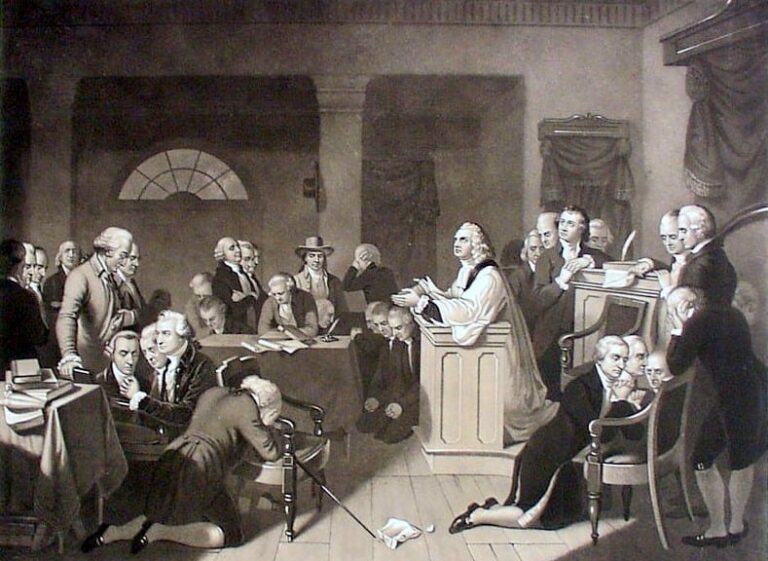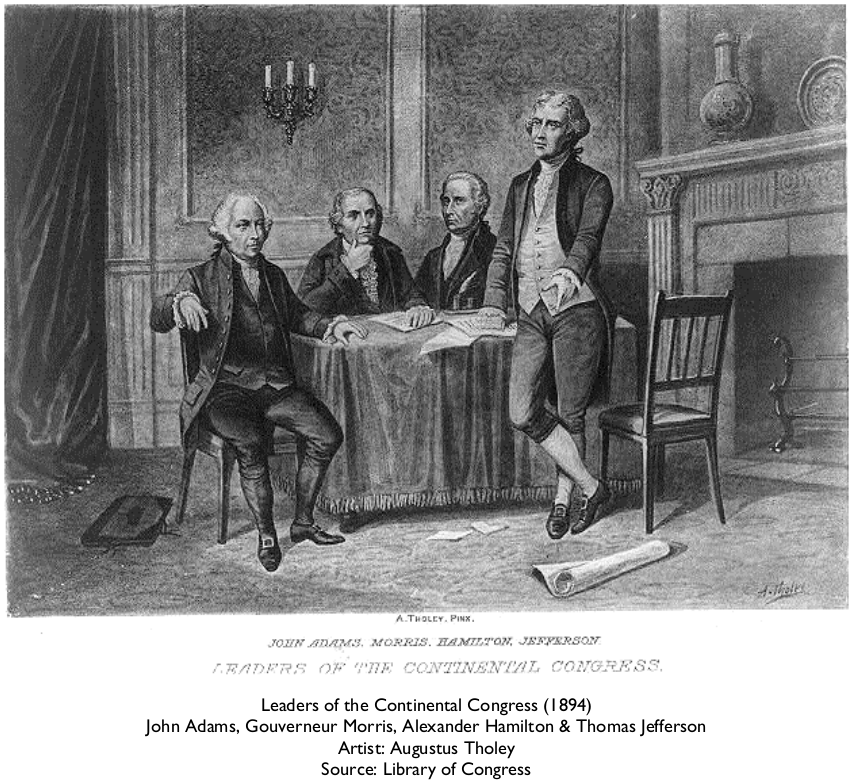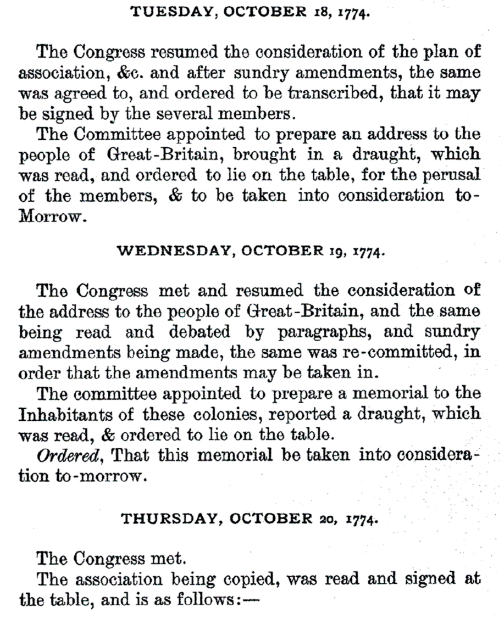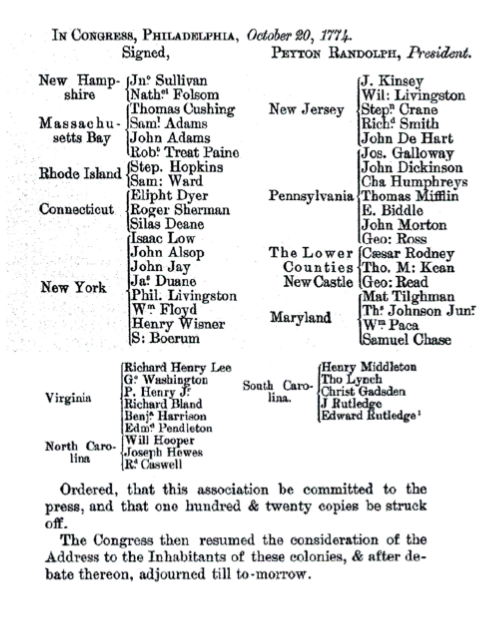
The Articles of Association
of the 1st Continental Congress,
October 20, 1774
In his first inaugural address on March 4, 1861, Abraham Lincoln declared, “The Union is much older than the Constitution. It was formed, in fact, by the Articles of Association in 1774.”
I take the official oath to-day with no mental reservations and with no purpose to construe the Constitution or laws by any hypercritical rules; and while I do not choose now to specify particular acts of Congress as proper to be enforced, I do suggest that it will be much safer for all, both in official and private stations, to conform to and abide by all those acts which stand unrepealed than to violate any of them trusting to find impunity in having them held to be unconstitutional.
It is seventy-two years since the first inauguration of a President under our National Constitution. During that period fifteen different and greatly distinguished citizens have in succession administered the executive branch of the Government. They have conducted it through many perils, and generally with great success. Yet, with all this scope of precedent, I now enter upon the same task for the brief constitutional term of four years under great and peculiar difficulty. A disruption of the Federal Union, heretofore only menaced, is now formidably attempted.
I hold that in contemplation of universal law and of the Constitution the Union of these States is perpetual. Perpetuity is implied, if not expressed, in the fundamental law of all national governments. It is safe to assert that no government proper ever had a provision in its organic law for its own termination. Continue to execute all the express provisions of our National Constitution, and the Union will endure forever, it being impossible to destroy it except by some action not provided for in the instrument itself.
Again: If the United States be not a government proper, but an association of States in the nature of contract merely, can it, as a contract, be peaceably unmade by less than all the parties who made it? One party to a contract may violate it--break it, so to speak--but does it not require all to lawfully rescind it?
Descending from these general principles, we find the proposition that in legal contemplation the Union is perpetual confirmed by the history of the Union itself. The Union is much older than the Constitution. It was formed, in fact, by the Articles of Association in 1774. It was matured and continued by the Declaration of Independence in 1776. It was further matured, and the faith of all the then thirteen States expressly plighted and engaged that it should be perpetual, by the Articles of Confederation in 1778. And finally, in 1787, one of the declared objects for ordaining and establishing the Constitution was "to form a more perfect Union."
But if destruction of the Union by one or by a part only of the States be lawfully possible, the Union is less perfect than before the Constitution, having lost the vital element of perpetuity.
It follows from these views that no State upon its own mere motion can lawfully get out of the Union; that resolves and ordinances to that effect are legally void, and that acts of violence within any State or States against the authority of the United States are insurrectionary or revolutionary, according to circumstances.
In his history of the Revolution, Professor Robert Middlekauff describes the negotiations leading up to the adoption of the Articles of Association by the Continental Congress on October 20, 1774:
[T]he delegates . . . also decided on the ways nonimportation, nonconsumption, and nonexportation could be made realities. They entered rough water almost immediately. The South Carolina delegation now revealed how tightly tied its tongue was to the pursestrings of planters at home. The South Carolinians told the Congress that unless rice and indigo were exempted from the ban on exports, they would not sign the "Association," as the agreement on trade restrictions was now called. The announcement drew protests, but after the Carolinians agreed that only rice had to be protected Congress caved in.
The Association provided that the ban on imports from Britain would take effect on December 1; nonconsumption of East India Company tea would begin immediately; the prohibition of exports to Britain would, if it were still necessary, be observed after September 10, 1775. Everyone recognized that these instructions had little chance of success without force behind them. To give them force the Congress called for the election of a committee "in every county, city, and town" by those qualified to vote for representatives in the legislature. The committees would enforce the Association as committees in the preceding ten years had enforced earlier agreements. Not every town had such a committee, of course, but layers of committees would not leave much room for evasion. Under the Association, the committees were charged to operate as no government in America had ever operated. They were to inspect customshouse books, publish the names of offenders in local newspapers, and "break off all dealings" with violators, now baptized as "the enemies of American liberty." 1

From the Journals of the Continental Congress:

The Articles of Association
of the 1st Continental Congress,
October 20, 1774
We, his majesty's most loyal subjects, the delegates of the several colonies of New-Hampshire, Massachusetts-Bay, Rhode-Island, Connecticut, New-York, New-Jersey, Pennsylvania, the three lower counties of Newcastle, Kent and Sussex on Delaware, Maryland, Virginia, North-Carolina, and South-Carolina, deputed to represent them in a continental Congress, held in the city of Philadelphia, on the 5th day of September, 1774, avowing our allegiance to his majesty, our affection and regard for our fellow-subjects in Great-Britain and elsewhere, affected with the deepest anxiety, and most alarming apprehensions, at those grievances and distresses, with which his Majesty's American subjects are oppressed; and having taken under our most serious deliberation, the state of the whole continent, find, that the present unhappy situation of our affairs is occasioned by a ruinous system of colony administration, adopted by the British ministry about the year 1763, evidently calculated for enslaving these colonies, and, with them, the British Empire. In prosecution of which system, various acts of parliament have been passed, for raising a revenue in America, for depriving the American subjects, in many instances, of the constitutional trial by jury, exposing their lives to danger, by directing a new and illegal trial beyond the seas, for crimes alleged to have been committed in America: And in prosecution of the same system, several late, cruel, and oppressive acts have been passed, respecting the town of Boston and the Massachusetts-Bay, and also an act for extending the province of Quebec, so as to border on the western frontiers of these colonies, establishing an arbitrary government therein, and discouraging the settlement of British subjects in that wide extended country; thus, by the influence of civil principles and ancient prejudices, to dispose the inhabitants to act with hostility against the free Protestant colonies, whenever a wicked ministry shall chuse so to direct them.
To obtain redress of these grievances, which threaten destruction to the lives liberty, and property of his majesty's subjects, in North America, we are of opinion, that a non-importation, non-consumption, and non-exportation agreement, faithfully adhered to, will prove the most speedy, effectual, and peaceable measure: And, therefore, we do, for ourselves, and the inhabitants of the several colonies, whom we represent, firmly agree and associate, under the sacred ties of virtue, honour and love of our country, as follows:
1. That from and after the first day of December next, we will not import, into British America, from Great-Britain or Ireland, any goods, wares, or merchandise whatsoever, or from any other place, any such goods, wares, or merchandise, as shall have been exported from Great-Britain or Ireland; nor will we, after that day, import any East-India tea from any part of the world; nor any molasses, syrups, paneles, coffee, or pimento, from the British plantations or from Dominica; nor wines from Madeira, or the Western Islands; nor foreign indigo.
2. We will neither import nor purchase, any slave imported after the first day of December next; after which time, we will wholly discontinue the slave trade, and will neither be concerned in it ourselves, nor will we hire our vessels, nor sell our commodities or manufactures to those who are concerned in it.
3. As a non-consumption agreement, strictly adhered to, will be an effectual security for the observation of the non-importation, we, as above, solemnly agree and associate, that from this day, we will not purchase or use any tea, imported on account of the East-India company, or any on which a duty hath been or shall be paid; and from and after the first day of March next, we will not purchase or use any East-India tea whatever; nor will we, nor shall any person for or under us, purchase or use any of those goods, wares, or merchandise, we have agreed not to import, which we shall know, or have cause to suspect, were imported after the first day of December, except such as come under the rules and directions of the tenth article hereafter mentioned.
4. The earnest desire we have not to injure our fellow-subjects in Great-Britain, Ireland, or the West-Indies, induces us to suspend a nonexportation, until the tenth day of September, 1775; at which time, if the said acts and parts of acts of the British parliament herein after mentioned, ate not repealed, we will not directly or indirectly, export any merchandise or commodity whatsoever to Great-Britain, Ireland, or the West-Indies, except rice to Europe.
5. Such as are merchants, and use the British and Irish trade, will give orders, as soon as possible, to their factors, agents and correspondents, in Great-Britain and Ireland, not to ship any goods to them, on any pretence whatsoever, as they cannot be received in America; and if any merchant, residing in Great-Britain or Ireland, shall directly or indirectly ship any goods, wares or merchandize, for America, in order to break the said non-importation agreement, or in any manner contravene the same, on such unworthy conduct being well attested, it ought to be made public; and, on the same being so done, we will not, from thenceforth, have any commercial connexion with such merchant.
6. That such as are owners of vessels will give positive orders to their captains, or masters, not to receive on board their vessels any goods prohibited by the said non-importation agreement, on pain of immediate dismission from their service.
7. We will use our utmost endeavours to improve the breed of sheep, and increase their number to the greatest extent; and to that end, we will kill them as seldom as may be, especially those of the most profitable kind; nor will we export any to the West-Indies or elsewhere; and those of us, who are or may become overstocked with, or can conveniently spare any sheep, will dispose of them to our neighbours, especially to the poorer sort, on moderate terms.
8. We will, in our several stations, encourage frugality, economy, and industry, and promote agriculture, arts and the manufactures of this country, especially that of wool; and will discountenance and discourage every species of extravagance and dissipation, especially all horse-racing, and all kinds of games, cock fighting, exhibitions of shews, plays, and other expensive diversions and entertainments; and on the death of any relation or friend, none of us, or any of our families will go into any further mourning-dress, than a black crepe or ribbon on the arm or hat, for gentlemen, and a black ribbon and necklace for ladies, and we will discontinue the giving of gloves and scarves at funerals.
9. Such as are venders of goods or merchandize will not take advantage of the scarcity of goods, that may be occasioned by this association, but will sell the same at the rates we have been respectively accustomed to do, for twelve months last past. And if any vender of goods or merchandise shall sell such goods on higher terms, or shall, in any manner, or by any device whatsoever, violate or depart from this agreement, no person ought, nor will any of us deal with any such person, or his or her factor or agent, at any time thereafter, for any commodity whatever.
10. In case any merchant, trader, or other person, shall import any goods or merchandize, after the first day of December, and before the first day of February next, the same ought forthwith, at the election of the owner, to be either re-shipped or delivered up to the committee of the country or town, wherein they shall be imported, to be stored at the risk of the importer, until the non-importation agreement shall cease, or be sold under the direction of the committee aforesaid; and in the last-mentioned case, the owner or owners of such goods shall be reimbursed out of the sales, the first cost and charges, the profit, if any, to be applied towards relieving and employing such poor inhabitants of the town of Boston, as are immediate sufferers by the Boston port-bill; and a particular account of all goods so returned, stored, or sold, to be inserted in the public papers; and if any goods or merchandizes shall be imported after the said first day of February, the same ought forthwith to be sent back again, without breaking any of the packages thereof.
11. That a committee be chosen in every county, city, and town, by those who are qualified to vote for representatives in the legislature, whose business it shall be attentively to observe the conduct of all persons touching this association; and when it shall be made to appear, to the satisfaction of a majority of any such committee, that any person within the limits of their appointment has violated this association, that such majority do forthwith cause the truth of the case to be published in the gazette; to the end, that all such foes to the rights of British-America may be publicly known, and universally condemned as the enemies of American liberty; and thenceforth we respectively will break off all dealings with him or her.
12. That the committee of correspondence, in the respective colonies, do frequently inspect the entries of their customhouses, and inform each other, from time to time, of the true state thereof, and of every other material circumstance that may occur relative to this association.
13. That all manufactures of this country be sold at reasonable prices, so that no undue advantage be taken of a future scarcity of goods.
14. And we do further agree and resolve that we will have no trade, commerce, dealings or intercourse whatsoever, with any colony or province, in North-America, which shall not accede to, or which shall hereafter violate this association, but will hold them as unworthy of the rights of freemen, and as inimical to the liberties of their country.
And we do solemnly bind ourselves and our constituents, under the ties aforesaid, to adhere to this association, until such parts of the several acts of parliament passed since the close of the last war, as impose or continue duties on tea, wine, molasses, syrups paneles, coffee, sugar, pimento, indigo, foreign paper, glass, and painters' colours, imported into America, and extend the powers of the admiralty courts beyond their ancient limits, deprive the American subject of trial by jury, authorize the judge's certificate to indemnify the prosecutor from damages, that he might otherwise be liable to from a trial by his peers, require oppressive security from a claimant of ships or goods seized, before he shall be allowed to defend his property, are repealed.—And until that part of the act of the 12 G. 3. ch. 24, entitled; "An act for the better securing his majesty's dock-yards magazines, ships, ammunition, and stores," by which any persons charged with committing any of the offenses therein described, in America, may be tried in any shire or county within the realm, is repealed and until the four acts, passed the last session of parliament, viz. that for stopping the port and blocking up the harbour of Boston, that for altering the charter and government of the Massachusetts-Bay and that which is entitled "An act for the better administration of justice, " and that "for extending the limits of Quebec" are repealed. And we recommend it to the provincial conventions, and to the committees in the respective colonies, to establish such further regulations as they may think proper, for carrying into execution this association.
The foregoing association being determined upon by the Congress, was ordered to be subscribed by the several members thereof; and thereupon, we have hereunto set our respective names accordingly.

-
Robert Middlekauff, The Glorious Cause: The American Revolution, 1763-1789 247-8 (Oxford Univ. Press, 1982). ↩